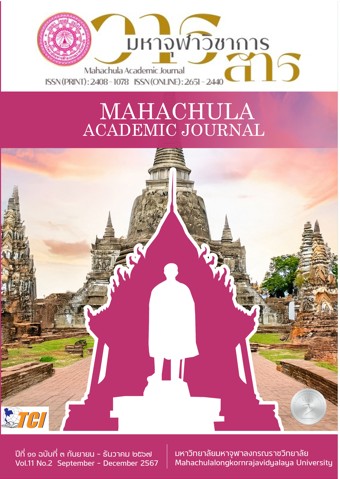Interpreting the Upālivāda Sutta by using Hans-Georg Gadamer's Hermeneutics
Main Article Content
Abstract
In the Upālivāda Sutta, the Buddha and Nigaṇṭha Nātaputta hold differing views on the doctrine of karma, specifically regarding the consequences of actions. This article aims to address the question: Why does the Buddha consider mental actions (mano-kamma) to have the greatest impact, while Nigaṇṭha Nātaputta believes that
physical actions (kāyaduccarita) have the most significant consequences? The article is divided into three parts: (1) The first part discusses the origin and development of
hermeneutics. (2) The second part elaborates on Hans-Georg Gadamer’s hermeneutics. (3) The third part interprets the teachings on karma as presented in the Upāli Sutta, applying Gadamer’s hermeneutical approach. The interpretation reveals that, for the Buddha, prejudice refers to his belief or understanding that the mind plays a central
role as the primary driving force behind physical, verbal, and mental actions. From the Buddha’s perspective, all phenomena (dhammā) are inherently led by the mind,
which consequently defines his horizon and leads him to view mental action (mano-kamma) as holding the greatest significance. On the other hand, for Nigaṇṭha Nāṭaputta, prejudice refers to his belief or understanding that physical suffering purifies one’s life-force, leading to liberation from atomic karma or past karma. In his view, the life-force
(jīva) is material and given importance accordingly. This prejudice shapes Nāṭaputta’s horizon, making him regard bodily restraint (k āya-daṇḍa) as holding the utmost
importance. However, it could be argued that the Buddha completely eradicated defilements (kilesa) and mental taints (āsava), and that Nigaṇṭha Nāṭaputta was also
pure and enlightened. So why does this article portray the Buddha and Nigaṇṭha Nāṭaputta as Prejudiced ? Describing them as Prejudiced may seem like labeling them as impure,
when in reality they were not. This objection can be addressed by clarifying that, according to Gadamer’s concept, the term “prejudice” does not refer to partiality driven by love, hatred, delusion, or fear, which are considered unwholesome. Instead, it refers to beliefs or understandings that serve as a framework for humans to better comprehend the world and their surroundings. In this sense, “prejudice” is a neutral term, not a negative one. Therefore, describing the Buddha and Nigaṇṭha Nāṭaputta
as having Prejudiced is not labeling them as impure, but rather acknowledging that they had specific beliefs and understandings.
Article Details

This work is licensed under a Creative Commons Attribution-NonCommercial-NoDerivatives 4.0 International License.
References
กีรติ บุญเจือ. อรรถปริวรรตในปรัชญาศาสนาและจริยศาสตร์. กรุงเทพมหานคร: มหาวิทยาลัยราชภัฏสวนสุนันทา, ๒๕๖๐.
ประยงค์ แสนบุราณ. ปรัชญาอินเดีย. กรุงเทพมหานคร: โอเดียนสโตร์, ๒๕๔๗.
มหาจุฬาลงกรณราชวิทยาลัย. พระไตรปิฎกภาษาไทย ฉบับมหาจุฬาลงกรณราชวิทยาลัย. กรุงเทพมหานคร: โรงพิมพ์มหาจุฬาลงกรณราชวิทยาลัย, ๒๕๓๙.
สุนทร ณ รังษี. ปรัชญาอินเดีย: ประวัติและลัทธิ. พิมพ์ครั้งที่ ๒. กรุงเทพมหานคร: โรงพิมพ์จุฬาลงกรณมหาวิทยาลัย, ๒๕๓๗.
สุมาลี มหณรงค์ชัย. ภูมิปัญญาอินเดียโบราณ: ประวัติศาสตร์และปรัชญา ทางสายกลาง พุทธ พราหมณ์ เชน. กรุงเทพมหานคร: สยามปริทัศน์, ๒๕๖๒.
A. Kadir Cucen. “Is Heidegger’s Hermeneutics an Interpretation of Being of Dasein?”. European Journal of Multidisciplinary Studies. Vol. 2 No. 5 (May-August 2017): 252-260.
Hans-Georg Gadamer. Truth and Method. Translation revised by Joel Weinsheimer and Donald G. Marshall. second edition. London: Bloomsbury, 2004.
Joseph Pamplany et al. Biblical Hermeneutics. Thalassery: Vimala Offset Press, 2020.
Karl Simms. Hans-Georg Gadamer. New York: Routledge, 2015.
Monalisha Biswas. “The Development Of Hermeneutics In The Era Of Friedrich Schleiermacher”. Educational Administration: Theory and Practice. Vol.30 No.5 (2024): 14439-14442.
Stanley E. Porter & Jason C. Robinson. Hermeneutics An Introduction to Interpretive Theory. United States of America: Eerdmans Publishing, 2011.


